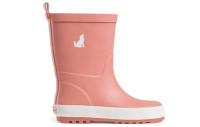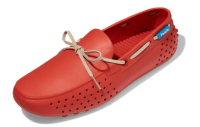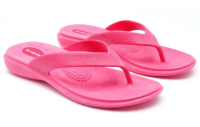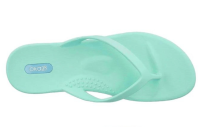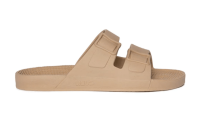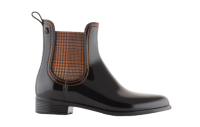Melissa (including Mini Melissa) is likely a vegan brand. In 2022 they were a Vegan Society-certified brand, although as of April 5, 2023 it has lapsed. The brand maintains that their products are “Made with no animal products or materials and with approximately 6% carbon from renewable sources.”
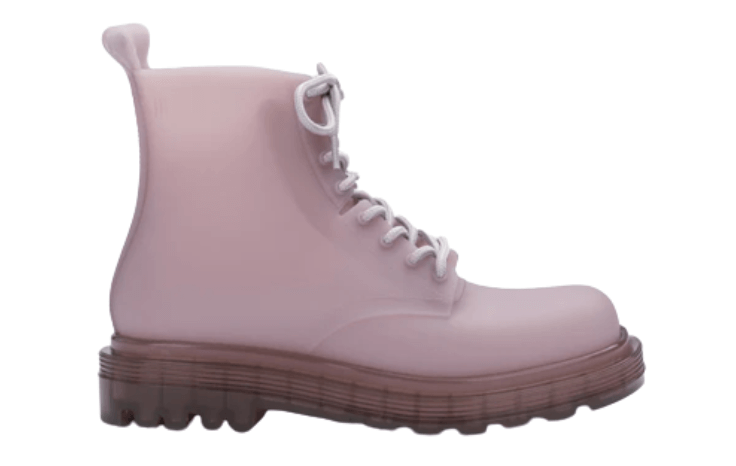
Melissa Brand Overview
Melissa (and Mini Melissa) make their shoes at their parent company's factory in Brazil. They use a proprietary, REACH-compliant PVC plastic, Melflex®, that's composed of a mix of virgin, recycled (pre-consumer - from their own factory), and bio-based plastic. Many of their shoes, boots and sandals are 100% recyclable, and the company has even set up a shoe collection program where you can return your old Melissa's to be recycled. We're not aware of any charity efforts the company is involved with.
- Were Vegan Society certified
- Parent company also vegan
- FSC-certified packing materials
- Design collaboration pioneer
- Available at major stores
- Worldwide franchisees
- 4,000 points of sale worldwide
- Based & made in Brazil
- Bubblegum scent
- Have food collection & donation program
- REACH compliant material
- Seasonality-focused
- 100% recyclable
- Contain 30% recycled materials
- Wide product range
- Kid’s footwear line
- Founded in 1979
- Many waterproof models
- Doesn’t appear to be charitable
- SMETA certified (fair labour)
About Melissa & Mini Melissa
Founded in 1979, Melissa is a Brazilian footwear brand with several international franchises, and over 8,000 points of sale across the world. Melissa and Mini Melissa shoes are made in Brazil, and their main material is a 100% recyclable proprietary PVC plastic called Melflex®. The brand is owned by Grendene, which is one of the world’s largest manufacturers of synthetic footwear.
What materials are used to make Melissa shoes, boots & sandals?
The primary material used for many of Melissa, and Mini Melissa's shoes, boots and sandals is Melflex®, their proprietary and 100% recyclable PVC plastic. Some of their models feature additional materials, such as metal buckles, velcro straps, shoe laces, and various fabrics, such as faux fur. Some of their sandals are made entirely from a bio-based EVA from sugar cane, called MelFree (launched in 2021).Are the materials used to make Melissa shoes eco-friendly/sustainable?
From an environmentally-friendly materials standpoint, Melissa (& Mini Melissa) shoes, boots & sandals are at least somewhat eco-friendly, as the PVC plastic used to make them is 100% recyclable (according to the brand at least). The brand also claims that their PVC contains 30% recycled material (pre-consumer - mainly from their own factory) and raw material of renewable origin in their composition. Melissa shoes are also made in compliance with the requirements of REACH (Registration, Evaluation, Authorisation and Restriction of Chemical substances), the European Community Regulation on chemicals and their safe use. REACH has one of the world’s most stringent standards in the world.Does production of Melissa shoes create a lot of CO2 emissions?
From a carbon footprint standpoint, it's difficult to asses the impact that Melissa has, and what they do to remediate it. Melissa and Mini Melissa's shoes are made by their parent company, Grendene, which appears to share some details of their sustainability, but we could not access that section of their website when visiting, due to a technical error. We have reached out to them for details about their environmental impact, and are awaiting reply. It is worth noting, that their factory in Brazil has a bio-digester that turns food and other organic waste from their factory into fertilizer, or gas for kitchen stoves.Does Melissa use eco-friendly packaging?
According to the brand, "our paper packaging is certified as being responsibly sourced by the Forestry Stewardship Council (FSC)," although they do not make mention of other materials that may come in the packaging.Can I recycle my Melissa shoes?
Yes - according to the brand, "On 15/10/2019, Conscious Consumption Day, we paused our sales, cleared the Melissa Clubs, of which there are more than 320, and spent the day discussing our shoe collection system and reinforcing the reverse logistics of our primary material. Since that day, all our shops collect Melissas that can no longer be used so that they can be correctly disposed of."How should I dispose of my worn out Melissa shoes?
Simply drop them off at a Melissa Club to be recycled. If there is not a Melissa Club in your area, refer to the Melissa website in your region for contact information, or the main Melissa Brazil website for instructions on how to recycle your old Melissa or Melissa Mini shoes.Where can I buy Melissa shoes?
Currently Melissa is present in more than 80 countries, which includes more than 4,000 points of sale internationally, including some major online and offline retailers and department stores, such as Nordstroms and Zappos. The franchise project comprises more than 350 Melissa Clubs in Brazil, in addition to 130 branded stores abroad. Many countries even have their own Melissa website including Brazil, Canada, USA, India, Philippines, Malaysia, France, and Signapore, among others.Do Melissa shoes ever go on sale?
Yes, most of Melissa's international franchisee websites offer a discount off of your first order when you subscribe, which can vary in amount. Most Melissa websites also have a sale section, such as this one on their American website.Are Melissa shoes ethically made?
Melissa's factory (via their parent company Grendene), is located in Brazil, so their worker's are protected by the labour laws of Brazil, which include 8 hour work days, or 44 hour work weeks (similar to Alberta, Canada). Our employees are directly and formally hired in compliance with current labor legislation. According to the Melissa team, "Our leadership is responsible for guaranteeing these rights, fair wages, valuing our teams, and responsibility towards other stakeholders. In 2021, we obtained the maximum recognition in the evaluation of the Associação Brasileira do Varejo Têxtil (ABVTEX), receiving the Gold seal. SMETA (Sedex Members Ethical Trade Audit), one of the most recognized audits worldwide on ethical management and social responsibility, has ensured, for another year, our responsibility for the sustainable development of our manufacturing units." The complete report of these audits can be found here.Does Melissa promote ‘slow fashion’ or a ‘circular economy’?
Melissa gets mixed reviews from us with regard to their promotion/inclusion of circular economy principles. In the positive column, they claim to incorporate bio-based materials into their proprietary PVC, Melflex®; they employ fair labour; they produce close to their headquarters; and they have a shoe recycling system in place. On the other side of the coin however, they produce their shoes using a lot of virgin plastic; they follow trends (which leads to high product turnover and consumers buying much more than they need); and they promote seasonal consumption (which leads to overproduction).Is Melissa a charitable company?
We’ve asked the Melissa team about any charitable initiatives they're involved with (if any), and they told us that, "Grendene (the parent company of Melissa & Mini Melissa) is committed to expanding our values to communities around us. We seek to promote awareness of sustainability and environments through educational projects in schools and local institutions. We also work to contribute to the socioeconomic development of women in situations of vulnerability with our Sustainable Women Entrepreneur Network project. Along with that, Grendene’s have a food donation program, where we collect non-perishable food inside our factories and bring it to social institutions, especially during the Holidays."Are Melissa shoes waterproof?
Melissa (& Mini Melissa) shoes are made from a proprietary waterproof PVC material, Melflex®. So while many of their shoe and boots models are fully waterproof and would be considered 'rain boots/shoes,' some of their models feature cut out toes and low-cut styles that would be no match for a rainy day. The Melissa team has also told us that "Most of our products are made exclusively of MelFlex, which is a great technology, can perform well in contact with water. Melissa shoes sustain water exposure without damaging the product, and the MelFlex also acts as a protector from water damage. This does not mean that all shoes are impermeable - some parts of certain products may get wet under certain circumstances."Related Brands
Melissa Footwear Range
Melissa makes a wide range shoes, boots and sandals in the female aesthetic. Most of their shoes are made entirely of their proprietary PVC plastic, Melflex®, while others incorporate different materials for accents, features and various adornment. Some of Melissa's footwear is minimalist, monochromatic and elegant, while other items in their collection are more bold, multi-coloured, adorned, or more geared towards what's trending in street style. Melissa does frequent collaborations with designers, brands, and pop-culture icons, which introduces an even wider range of aesthetics into their overall collection.
- Knee boots
- Combat boots
- Ankle boots
- Booties
- Brogue boots
- Creepers
- Chelsea boots
- Chukka boots
- Rain boots
- Chunky-heeled boots
- Slides
- Strapped sandals
- 2-strap sandals
- Flip-flops
- Platform thongs
- Thong sandals
- Clogs
- Ballet flats
- Pointed-toe flats
- Mary Janes
- Platform sneakers
- Classic sneakers
- Low-top sneakers
- Slip-on sneakers
- Sling-back heels
- Chunky heels
- Mules
- Heeled mules
- Low block heels
- Insulated sneakers
- Platform Oxfords

